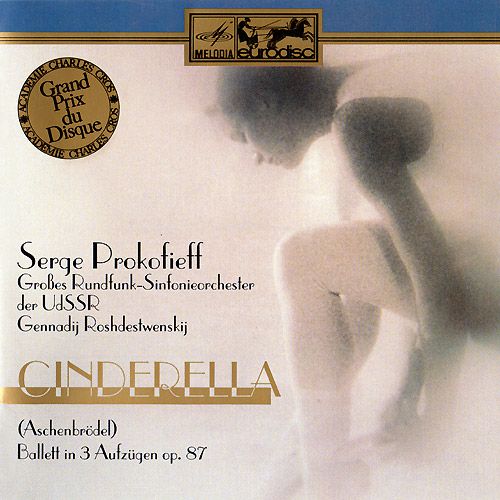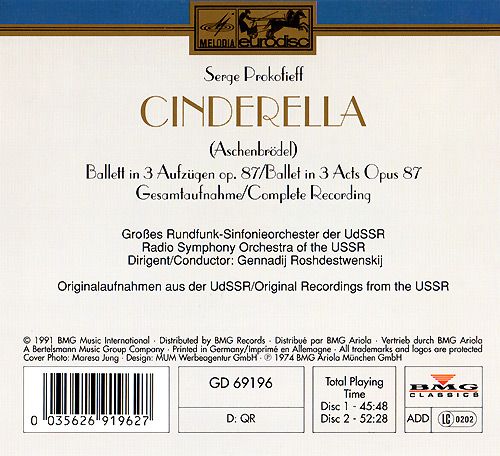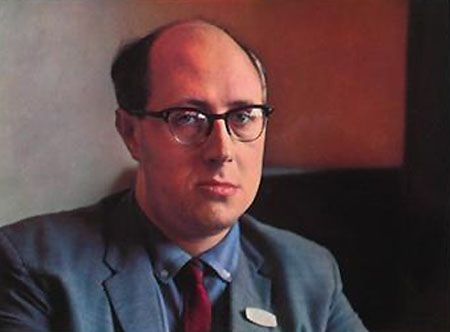wimpel69
11-12-2014, 04:23 PM
"Quite simply the best-played, most atmospheric and affecting Cinderella we have ever had on disc.
On every count this is one of the best recordings, not only of the year but the 1990s."
Penguin Classical Guide
EAC-FLAC link below. This is my own rip. Complete artwork,
LOG and CUE files included. Do not share. Buy the original!
Please leave a "Like" or "Thank you" if you enjoyed this!
Sergei Prokofiev was Tchaikovsky's greatest successor in the realm of narrative Russian ballet, evidenced
by a body of works which have earned a permanent place in the international repertoire. The scenario of the
composer's Cinderella is essentially faithful to the beloved tale by Charles Perrault.
Act One serves largely to introduce the characters. The heroine's father is a weak man who fails to protect his
daughter from the wickedness of a stepmother and two stepsisters. Cinderella takes pity on an old beggar woman,
who reveals herself as Cinderella's Fairy Godmother after all the others have departed for the Prince's ball.
The ball itself is the setting for Act Two, which is dominated by an exquisite, lusciously scored waltz. The Prince
and Cinderella, in a classic instance of love at first sight, dance a rapturous pas de deux. The music for this
concluding number of the act, when Cinderella realizes she must leave just as the clock strikes midnight, is
remarkably powerful and threatening; snarling trombones and bass drum dominate the musical texture.
Act Three focuses on the Prince's search for the mysterious woman he has fallen in love with. To the
accompaniment of an amusing recurring passage of "traveling" music, the Prince visits a number of foreign
lands. In each he encounters a tempting beauty who dances for him. The next scene, "The Morning After
the Ball," opens with all the characters in Cinderella's household discussing the events of the previous night.
The Prince arrives in search of his love, and when Cinderella's identity is revealed, the Fairy Godmother
magically transports the two lovers to an enchanted realm.
Composed over the span of four years, the score took Prokofiev an uncommonly long time to complete.
Because of the German invasion of Russia in 1941, Prokofiev set aside the ballet to take on more patriotic
themes, devoting his effort to the epic opera War and Peace (1941-1943). He resumed work on Cinderella
after an Allied victory over Germany seemed imminent, and it received a triumphant premiere on November
21, 1945. In the following year Prokofiev extracted three suites from the ballet which have become concert
favorites; the third is notable for its incorporation of "The Three Oranges" from the composer's opera
The Love for Three Oranges (1919). Other numbers from the ballet found their way into an independent
Waltz Suite (1946) that also includes excerpts from War and Peace and the film score Lermontov (1941).
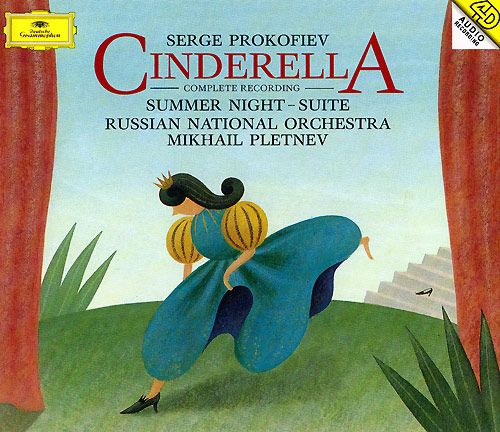
Music Composed by
Sergei Prokofiev
Played by the
Russian National Orchestra
Conducted by
Mikhail Pletnev
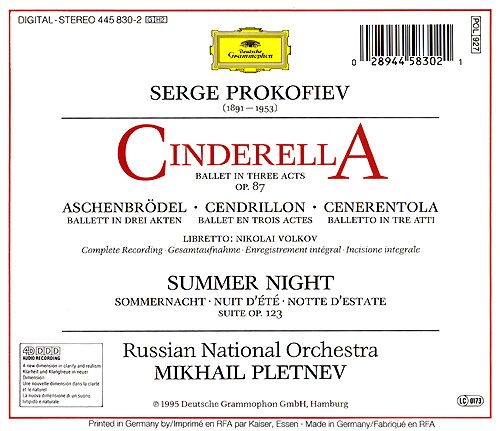
"Recordings of the complete Cinderella ballet are few, so this recording filled a big gap in the
record catalog. I was familiar with the ballet from an excellent old LP recording put out by Angel/Melyodia.
This recording by the Russian National Symphony became my replacement, and it is a very worthy
successor. The ballet was written during 1941 but was not completed until after World War II. The
orchestration is not as opulent as Romeo and Juliet, closer in spirit to Tchaikovsky's ballets. The most
famous music is the Cinderella waltz, which is often included on Prokofiev recordings as filler. But
make no mistakes; this ballet is filled with wonderful and unforgettable melodies. Cinderella was
performed on November 21, 1945 to great acclaim. However, the popularity of the ballets follows
in the wake of Romeo.
The recording also includes a suite from the comic opera Betrothal in a Monastery going under the
name Summer Night. It is a charming 5 movement suite that contains all of the best music from
the opera. It makes a wonderful addition to the CD set.
This recording could not be better and has been named by Gramophone magazine as among its
specially recommended essential recordings. Mikhail Pletnev does a superb job as conductor and
the recording is clear and well-balanced. Tempos are excellent throughout the recording and the
Russian National responds beautifully to the demands of the music's color and shading. The booklet
accompanying the record includes a synopsis of the action and a track by track explanation of the
action. This recording is a must have for anyone interested in Prokofiev's music and in ballet music."
Amazon Reviewer
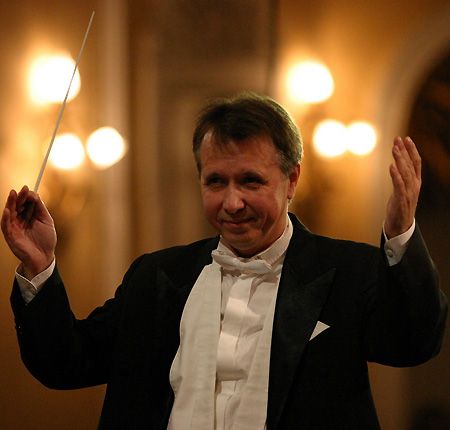
DOWNLOAD LINK - https://mega.co.nz/#!jRAlgAqD!uNa6vxl4-S_jHgc_N1RF_1tBnKiX8BScnkWQXjJhssI
Source: Deutsche Grammophon CDs, 1995 (my rip!)
Format: FLAC(RAR), DDD Stereo, Level: -5
File Size: 576 MB (incl. artwork, booklet, log & cue)
Enjoy! Don't share! Buy the origina! Please leave a "Like" or "Thank you" if you enjoyed this! :)
On every count this is one of the best recordings, not only of the year but the 1990s."
Penguin Classical Guide
EAC-FLAC link below. This is my own rip. Complete artwork,
LOG and CUE files included. Do not share. Buy the original!
Please leave a "Like" or "Thank you" if you enjoyed this!
Sergei Prokofiev was Tchaikovsky's greatest successor in the realm of narrative Russian ballet, evidenced
by a body of works which have earned a permanent place in the international repertoire. The scenario of the
composer's Cinderella is essentially faithful to the beloved tale by Charles Perrault.
Act One serves largely to introduce the characters. The heroine's father is a weak man who fails to protect his
daughter from the wickedness of a stepmother and two stepsisters. Cinderella takes pity on an old beggar woman,
who reveals herself as Cinderella's Fairy Godmother after all the others have departed for the Prince's ball.
The ball itself is the setting for Act Two, which is dominated by an exquisite, lusciously scored waltz. The Prince
and Cinderella, in a classic instance of love at first sight, dance a rapturous pas de deux. The music for this
concluding number of the act, when Cinderella realizes she must leave just as the clock strikes midnight, is
remarkably powerful and threatening; snarling trombones and bass drum dominate the musical texture.
Act Three focuses on the Prince's search for the mysterious woman he has fallen in love with. To the
accompaniment of an amusing recurring passage of "traveling" music, the Prince visits a number of foreign
lands. In each he encounters a tempting beauty who dances for him. The next scene, "The Morning After
the Ball," opens with all the characters in Cinderella's household discussing the events of the previous night.
The Prince arrives in search of his love, and when Cinderella's identity is revealed, the Fairy Godmother
magically transports the two lovers to an enchanted realm.
Composed over the span of four years, the score took Prokofiev an uncommonly long time to complete.
Because of the German invasion of Russia in 1941, Prokofiev set aside the ballet to take on more patriotic
themes, devoting his effort to the epic opera War and Peace (1941-1943). He resumed work on Cinderella
after an Allied victory over Germany seemed imminent, and it received a triumphant premiere on November
21, 1945. In the following year Prokofiev extracted three suites from the ballet which have become concert
favorites; the third is notable for its incorporation of "The Three Oranges" from the composer's opera
The Love for Three Oranges (1919). Other numbers from the ballet found their way into an independent
Waltz Suite (1946) that also includes excerpts from War and Peace and the film score Lermontov (1941).

Music Composed by
Sergei Prokofiev
Played by the
Russian National Orchestra
Conducted by
Mikhail Pletnev

"Recordings of the complete Cinderella ballet are few, so this recording filled a big gap in the
record catalog. I was familiar with the ballet from an excellent old LP recording put out by Angel/Melyodia.
This recording by the Russian National Symphony became my replacement, and it is a very worthy
successor. The ballet was written during 1941 but was not completed until after World War II. The
orchestration is not as opulent as Romeo and Juliet, closer in spirit to Tchaikovsky's ballets. The most
famous music is the Cinderella waltz, which is often included on Prokofiev recordings as filler. But
make no mistakes; this ballet is filled with wonderful and unforgettable melodies. Cinderella was
performed on November 21, 1945 to great acclaim. However, the popularity of the ballets follows
in the wake of Romeo.
The recording also includes a suite from the comic opera Betrothal in a Monastery going under the
name Summer Night. It is a charming 5 movement suite that contains all of the best music from
the opera. It makes a wonderful addition to the CD set.
This recording could not be better and has been named by Gramophone magazine as among its
specially recommended essential recordings. Mikhail Pletnev does a superb job as conductor and
the recording is clear and well-balanced. Tempos are excellent throughout the recording and the
Russian National responds beautifully to the demands of the music's color and shading. The booklet
accompanying the record includes a synopsis of the action and a track by track explanation of the
action. This recording is a must have for anyone interested in Prokofiev's music and in ballet music."
Amazon Reviewer

DOWNLOAD LINK - https://mega.co.nz/#!jRAlgAqD!uNa6vxl4-S_jHgc_N1RF_1tBnKiX8BScnkWQXjJhssI
Source: Deutsche Grammophon CDs, 1995 (my rip!)
Format: FLAC(RAR), DDD Stereo, Level: -5
File Size: 576 MB (incl. artwork, booklet, log & cue)
Enjoy! Don't share! Buy the origina! Please leave a "Like" or "Thank you" if you enjoyed this! :)
